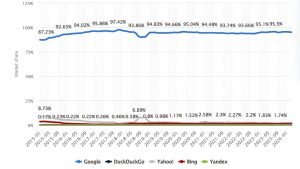From inert, fledgling tools in the early 1990s, search engines have grown with the years. They are evolving to serve more relevant, personalised, and varied results as technology improves and users develop new behaviour methods. This sets deep implications for digital marketing strategies. Businesses have to keep up by learning these developments and changing their methods accordingly.
The Rise of Mobile Search
Probably one of the most major changes to the way people search is a move to mobile. According to Statista, 58.99% of all website traffic globally came from mobile devices in Q4 2022. This trend, driven by search engines, has further channelized attention toward mobile-friendly content and compelled Google to come up with mobile-first indexing.
For digital marketers, this means:
1) Ensuring that websites are responsive and optimized for mobile.
2) Targeting local SEO, given that most mobile searches are driven by local intent
3) Targeting voice search, which occurs on mobile devices more than on any other type of device
Voice Search and Conversational Queries
Talking of voice search, it has really taken off with the spread of smart speakers and virtual assistants. Juniper Research predicts that by 2024, the number of digital voice assistants in use will reach 8.4 billion units – a number higher than the world’s population.
The swing to conversational queries requires that marketers do the following: optimize for long-tail keywords and natural language phrases; write content that answers specific questions; target featured snippets and position zero in search results. Artificial Intelligence and Machine Learning Search engines are now starting to utilize AI and machine learning in a greater capacity to better understand intent and return highly relevant results. Again, Google’s RankBrain and BERT algorithms are applied here. For digital marketers, this means:
Visual Search
With the enhanced capability of image recognition technology, visual search grew further in scope. Pinterest reported that it handled more than 600 million visual searches per month.
In preparation for this trend, marketers should be able to:
1) Image optimization through descriptive file names and alt text
2) Development and promotion of visual content in the form of infographics and videos
3) Leverage platforms like Pinterest and Google Lens
Zero-Click Searches
Almost 50% of all Google searches now end without any clicks to any web property, according to a study by SparkToro. This is because SERPs are increasingly featuring featured snippets, knowledge panels, or other types of features that directly answer users on the search results page.
To adapt to this, marketers must be able to:
1) Optimize content for featured snippets
2) Search result-driven brand awareness
3) Diversification of traffic sources away from organic search
EAT and YMYL
It’s important to note that Google is further emphasizing E-A-T—Expertise, Authoritativeness, and Trustworthiness—and doing so especially in regard to content relating to Your Money or Your Life. A refocus on quality and credibility took on new meaning in a time when misinformation is rife.
Digital marketers must:
1) Establish authorship and showcase expertise
2) Quality backlinks from authoritative sources
3) Create accurate, well-researched content—proper citation included
Video Search
Video content is gaining popularity. YouTube is the second-largest search engine after Google, with more than 3 billion searches per month. But that’s not all: other platforms, such as TikTok, are increasingly being used as a search platform, especially among a younger demographic.
Marketers should:
1) Produce and optimize video content for search;
2) Add transcripts and closed captions to videos in order to make them searchable;
3) Test short-form video platforms for brand visibility.
User Experience and Core Web Vitals
It is expected that search engines will further emphasize user experience as a ranking signal. Because of the Google Algorithm Update on Core Web Vitals in 2021, page experience signals now play an extremely critical role in search rankings.
Digital marketers should be able to do the following:
1) Improve page load times and overall site speed
2) Enhance mobile responsiveness and interactivity
3) Ensure content stability by reducing as many layout shifts as possible
Privacy and Cookieless Tracking
With rising concerns about privacy online, and the eventual sunsetting of third-party cookies, search engines and marketers are discovering new ways to track and target users.
Final checklist for marketers to prepare for:
1) Investment in First-Party Data Collection
2) Contextual Advertising Options
3) Building Direct Customer Relationship
Diverse Search Verticals
Users are increasingly going to a plethora of platforms to find a variety of things. This may be Amazon for product searches, TikTok for trending topics, or Reddit for niche information.
In this context, digital marketers have to:
1) Be present on at least some platforms where their audience is
2) Tailor content according to the peculiarities of each search vertical
3) Continuously monitor new emerging platforms and trends in search
Future of Search and Digital Marketing
Looking forward, a few trends will define how search and digital marketing will continue to evolve in the future:
1) Embedding Augmented Reality (AR) and Virtual Reality (VR) in search experiences
2) Personalization on an increasing level—thanks to AI and machine learning
3) Voice and visual search as important interfaces
4) More focus on privacy and data protection in marketing strategies
In the final analysis, the landscape has dramatically changed with respect to search and digital marketing; strategies need to evolve at par. Only by knowing these trends and adapting approaches in line can one guarantee that content continuously remains discoverable, relevant, and engaging to the target audience.
For a modern digital marketer to be ahead in such an evolving environment, he/she should:
1) Never stop monitoring trends in search and algorithm updates
2) Invest in various skill sets related to data analysis and AI.
3) Focus on producing high-quality, user-centered content
4) Embrace new technologies and platforms when they arrive
By doing this, businesses will turn the challenges that come with evolving search technologies into an opportunity for growth and engagement within the digital marketplace.
















